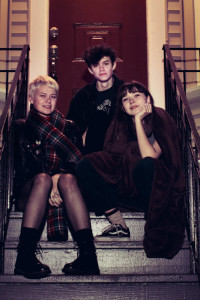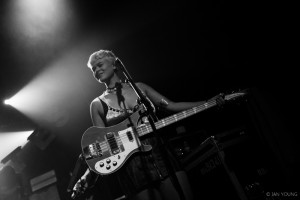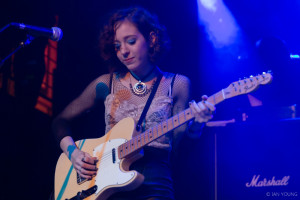Video: The Regrettes skyrocketing back to the future

The Regrettes perform at the Mezzanine in San Francisco on Nov. 16, 2016. Photo: Ian Young
High school junior Lydia Night and her friends started their garage-punk and rock band, The Regrettes, in January 2016. By November, they were signed to Warner Bros. Records and opening for Sleigh Bells. Three months later the Regrettes released full-length debut album, produced by Mike Elizondo (Dr. Dre, Eminem, Jay Z, Fiona Apple)—“Papa Mike” to 16-year-old Night, 19-year-olds Sage Chavis (bass) and Genessa Gariano (guitar), and 18-year-old Maxx Morando (drums).
The Frights, The Garden, The Regrettes, Dinosaurs
7 p.m., Saturday
The Chapel
Tickets: $15-$17 (Sold out).
“[Elizondo] is our dad and best friend, our everything,” Chavis said when she, Night and Morando (Gariano was called away on a family matter) met up with RIFF at their AirBNB rental south of San Francisco.
Everything is happening quickly now for the Regrettes, who’re back in San Francisco for Noise Pop next week, on a bill that also includes The Frights, The Garden and Dinosaurs.
The Regrettes actually met a few years ago while all of the members were taking musical classes at the School of Rock in Los Angeles. Night was the last friend to join, but left the school not long after arriving. The friends went their separate ways until reuniting in January 2016.
By then Night had a batch of songs in the bag, several of which made it into the band’s EP and album—vintage-yet-forward-leaning songs like “Hey Now” and “A Living Human Girl,” with fuzzy punk guitars, a retro beat and tempo and vocals a la The Strokes.

(L to R): Sage Chavis, Maxx Morando and Lydia Night in San Francisco on Nov. 15, 2016. Photo: Diana Cordero
The songs are on the surface about typical teenage fare like boys and adolescence, but with a mature outlook that questions conventions and doesn’t present easy answers.
“I can dress how I want/ Not looking for a show of hands,” Night snarls on “A Living Human Girl.” The band, and Night specifically, counts ‘50s and ‘60s pop and rock, as well as riot grrrl bands, as inspirations.
“My parents both love [older] music. It caught on and it’s so timeless,” Night said. “I’ve loved it since I was a little kid and that’s never gone away. When Night was 5, her cool dad took her to see all-female band the Donnas. She asked for a guitar on her 6th birthday.
Night might be the creative driving force of the band, never afraid to throw her personal life under the bus for the purpose of telling a good, relatable story. But as we learned when we met, Morando is the jokester, Chavis the experienced musician and Gariano who keeps the others on-task.
RIFF: Your walking that fine line between punk and pop. Which way would you rather lean?
Lydia Night: I don’t really think we’re pop or punk. [Not] pop, for sure. When I think of pop, I think modern pop, which we’re nothing like. But when you think of old music, going back to the ‘50s and ‘60s, pop music back then was The Beatles. There were so many great pop bands. If we were to call ourselves a pop band, it would be associating with that era of pop music, not today’s era. There are so many punk bands that we love, but that word—I want to set the record straight. When you think of The Ramones or The Clash, Sex Pistols… that’s way more of the punk that we relate to. Not bands like Green Day, or Paramore, or Blink 182. Now, a lot of people call themselves punk. It’s a weird word. A lot of people have many definitions of it.
Sage Chavis: There’s so many flavors of it.
Are you all still in school?
Night: Sage and Genessa have graduated. Maxx is in his senior year, and I’m in my junior year, but I’m home-schooled. … I started homeschooling so that it would be more flexible. It’s so much easier to get ahead and get all my work done. So, it sucks for Maxx.
Maxx Morando: Yeah, it does.
You’ve got a song, and very well-produced video, that talks about how others may see you? What inspired that song, and have you always had such a mature mindset?
Night: “A Living Human Girl” is inspired by everything that you’re surrounded with as a young girl turning into a woman, in high school. I wrote it freshman year when I was in this weird headspace of starting to really not like myself. There’s so much constant insecurity that you’re constantly surrounded [by] when you’re in high school—up to when you’re an adult, obviously. It doesn’t end. But especially when you’re in that bubble in high school. It’s very easy to not like yourself. I wrote that from the point of view of someone
who was more confident than I was at the time. It helped me through what I was going through. Once I started to sing the lyrics, I started to believe them; that I loved myself. And it worked! I think a lot of people can relate to that, whether you’re a girl or a boy. Everyone has boxes that people try [to] put them in and make them feel small. That song can help anyone going through that.
What do your friends say to you after they first hear “A Living Human Girl?”
Night: Most of my friends could really relate to it because I was writing it about them.
How’d you get hooked up with Mike Elizondo?
Night: “[One week after being signed our manager] asked me if I was free to meet with this dude from Warner Bros., or something. I didn’t think much of it. We’ve had so many meetings with people so you don’t want to think too much of it before you actually go in. You don’t know what’s going to happen and most of the time it doesn’t work out. I remember looking him up on Wikipedia right before meeting him at his studio, and I was like, ‘Oh shit, this is the real [deal].” I … thought he was going to be some douchey suit and tie, serious… His resume is ridiculous. I met him and instantly thought, ‘You are one of the coolest and nicest and most-genuine people I’ve met in my entire life. I can’t even explain to you how good of a person he is. If I was ever in trouble, he would be there no matter what.
Morando: Such a sweet man. He makes you feel comfortable.
Night: He’s so much more than out producer or A&R guy. He literally feels like a family member. I don’t know how I lived without knowing this man.
Follow Roman Gokhman at Twitter.com/RomiTheWriter.


